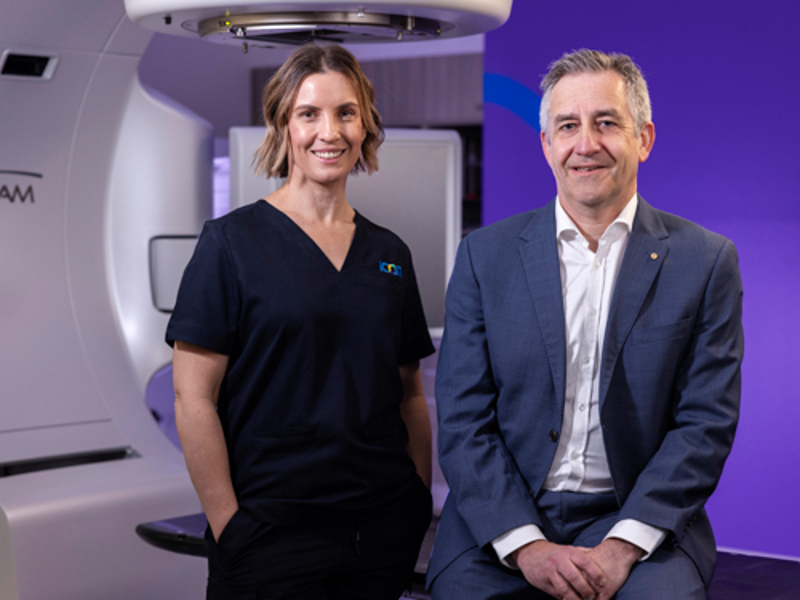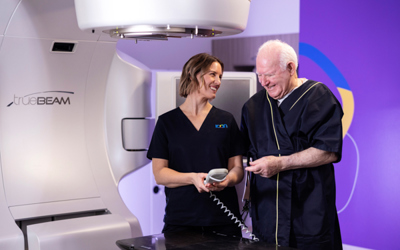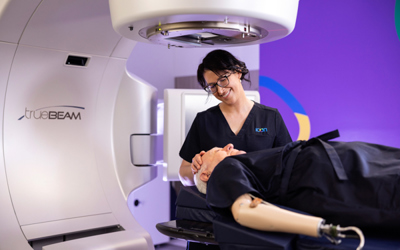Understanding side effects from radiotherapy treatment
Radiotherapy treatment can affect your body in different ways. It’s important to understand these effects and how you can keep your body healthy throughout treatment.
As radiation is targeted to a specific area of the body, you generally will only experience side effects in the area being treated. Your radiation oncologist and treatment team will discuss the type of side effects you may experience before your treatment begins.
Although most side effects are temporary and resolve after your radiotherapy has finished, there is a possibility that long-term effects may occur. Please discuss with your radiation oncologist as he/she is the best person to provide more details and this will be covered in the consent process before you start your treatment.
At Icon, we’re here to help you manage any side effects that you may have. Please talk to your care team about any side effects you are experiencing.

Skin reactions
Two to three weeks after your radiotherapy begins, you may experience skin redness, dryness, itching, blistering or peeling. These skin reactions may last throughout your treatment and will usually resolve a few weeks after treatment has finished. Sometimes these effects may worsen towards the end of treatment and for up to two weeks after your treatment ends.

Fatigue
Another common side effect you may have during your treatment is fatigue, a feeling of exhaustion and lack of energy. As you reach the end of your treatment, your fatigue may worsen. Every person is affected by fatigue in different ways, which may also depend on whether you are receiving other cancer treatments, such as chemotherapy. Fatigue usually resolves a few weeks after the completion of your treatment. To best manage your fatigue, it’s important to find a balance between rest and activity.

Hair loss
If you have hair in your treatment area, you may lose some or all of it a few weeks after treatment begins. Hair will usually regrow within three to six months. The colour or texture may be different, and it may grow back thinner or patchy.
Occasionally, hair loss can be permanent if you have a high dose of radiotherapy. Your doctor will discuss this with you before you start your treatment.

Bowel irritation
Radiotherapy can irritate the lower part of the bowel and you may experience some related symptoms towards the end of your treatment.
Symptoms of irritation can include:
An increase in the amount of bowel motions
Softer/looser bowel motions
Discomfort in passing a bowel motion
Urge to use your bowels without passing a motion (tenesmus)
Bleeding from the rectum (especially if you have haemorrhoids)
Mucus discharge

Bladder irritation
As you progress through your treatment, radiotherapy can irritate the bladder lining and the urethra (the tube that you urinate through).
Symptoms can include:
The need to urinate more often, including overnight
A sudden urge to empty your bladder
A burning sensation when you urinate
Change or reduction in your urine flow/stream and/or difficulty urinating
Blood in the urine

Sexual function
The effect of radiotherapy on sexual function can be different for everyone and will depend on the area being treated.
You can continue sexual activity without causing harm to your partner. However, it is important to use contraception to avoid pregnancy during treatment.
Radiotherapy to the prostate can affect the nerves that control erections and this may affect your ability to maintain an erection or you may feel a burning sensation during ejaculation. Your desire to have sexual intercourse may also decrease during treatment.

Nausea and vomiting
Nausea and vomiting can be common reactions from radiotherapy to certain areas of the body, such as the abdomen.

Pain and discomfort
Radiotherapy can cause a temporary increase in pain, swelling and aches in the area being treated.

Difficulty swallowing
Difficulty swallowing is a common reaction when the throat or oesophagus is in the treatment area. The throat may become inflamed and feel painful when swallowing or produce a sensation like a lump in the throat.

Changes in the mouth
Radiotherapy to the head and neck may cause changes in the mouth such as a temporary change or loss of taste, dry mouth, oral thrush and mouth ulcers.

Fertility
Whether fertility is impacted by radiotherapy depends on the area that is receiving treatment. If you are a woman having radiotherapy to the abdomen or pelvis, the amount of radiation absorbed by the ovaries will determine the potential impact on your fertility. Radiation to the pituitary gland may also affect your fertility, as this gland normally signals the ovaries to ovulate.
Radiation to both testes in men is rare, however, this will affect your fertility. If the radiation fields include the pelvis, there may be scattered radiation doses to the testes that can affect your fertility and this can be temporary or permanent depending on the radiation doses received. Please speak with your radiation oncologist if you or your partner wish to become pregnant or you have fertility concerns.
Side effects by area of the body
Ready to discuss your care?
We’re here to support you through your treatment. Get in touch with us for more information about our centre and the services we offer.





